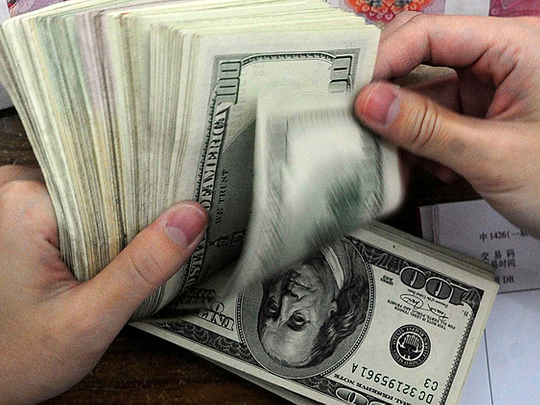
Dubai: Gulf investment entities have an estimated $1 trillion (Dh3.67 trillion) invested in US Treasury notes and bonds — with hundreds of millions of worth threatened by a credit downgrade if US lawmakers fail to reach an agreement on federal debt levels by next Tuesday.
And any failure by Democrats and Republicans to reach a deal will make Gulf Cooperation Council (GCC) nations rethink pegging their currencies’ to the sinking dollar.
“If the lawmakers in the US don’t find a solution to this brinkmanship, the effect on the Gulf will be very significant,” John Sfakianakis, chief economist at Banque Saudi Franci told Gulf News on Tuesday night from Riyadh.
Sfakianakis’ warning was echoed by Giyas Gokkent, group chief economist at the National Bank of Abu Dhabi, who said that the Saudi central bank alone holds $497 billion in US notes.
“The fallout for the Gulf will force officials to rethink their strategy of buying US notes,” Gokkent told Gulf News. “Every textbook says buy US notes as a conservative investment, but we will have to tear up those text books.”
The US Congress remained deeply divided yesterday as lawmakers grappled for a debt deal. As the dollar slid to new lows and stock markets wobbled, the White House sought to allay global fears that the US could default on its massive debt obligations for the first time in its history. “We remain confident,” White House spokesman Jay Carney said.
“In the end we believe that Congress will behave appropriately.”
In a solemn address to the nation late on Monday, President Barack Obama warned of a “deep economic crisis” if the US fails to raise its debt limit and urged Americans to pressure Republican lawmakers to compromise to avert a default. He called the weeks-long debt talks stalemate “a dangerous game” that the country “cannot afford to play.” Failure to compromise, he said in his speech, “would risk sparking a deep economic crisis — one caused almost entirely by Washington.”
He rejected a Republican proposal for a temporary increase in the debt limit, arguing it would leave the underlying problem unresolved and lead to a repeat of the current crisis in just six months’ time.












